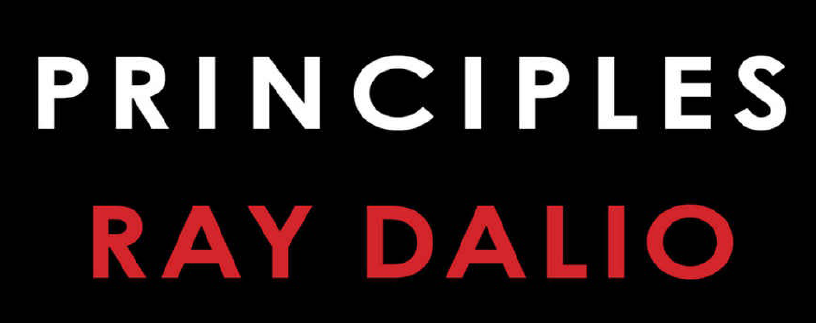最近开始实践“数量堆出质量”方法论,加入了背单词的大军,准备用1年的时间背完一遍18000个单词,目前大概背了1/4,为了检验自己的阶段性成果,买了一本最近非常火热的Ray Dalio写的《Principles》,中文名是《原则》。这本书确实非常通俗易懂,对于我来说,生词量较少,一篇大概几个生词。这本书反复强调的是:这是自己在处理工作和学习中遇到的问题的一些原则,它具有普世性,但是需要结合自己的实际情况,总结出自己的原则,并坚持和进化。这不就是将马克思普遍真理与中国实际相结合的翻版吗?下面是第1章Ray Dalio个人经历总结的最后一篇,对自己一生经历进行再提炼。
As I look back on my experiences, it’s interesting to reflect on how myperspectives have changed.
When I started out, each and every twist and turn I encountered, whether inthe markets or in my life in general, looked really big and dramatic up close,like unique life-or-death experiences that were coming at me fast.
With time and experience, I came to see each encounter as “another one ofthose” that I could approach more calmly and analytically, like a biologistmight approach an encounter with a threatening creature in the jungle: firstidentifying its species and then, drawing on his prior knowledge about itsexpected behaviors, reacting appropriately. When I was faced with types ofsituations I had encountered before, I drew on the principles I had learned for dealing with them. But when I ran into ones I hadn’t seen before, I would be
painfully surprised. Studying all those painful first-time encounters, I learnedthat even if they hadn’t happened to me, most of them had happened to other people in other times and places, which gave me a healthy respect for history, a hunger to have a universal understanding of how reality works, and the desire to build timeless and universal principles for dealing with it.
Watching the same things happen again and again, I began to see reality as a gorgeous perpetual motion machine, in which causes become effects that become causes of new effects, and so on. I realized that reality was, if not perfect, at least what we are given to deal with, so that any problems or frustrations I had with it were more productively directed to dealing with them effectively than complaining about them. I came to understand that my encounters were tests of my character and creativity. Over time, I came to
appreciate what a tiny and short-lived part of that remarkable system I am, and how it’s both good for me and good for the system for me to know how to interact with it well.
In gaining this perspective, I began to experience painful moments in a radically different way. Instead of feeling frustrated or overwhelmed, I saw pain as nature’s reminder that there is something important for me to learn.
Encountering pains and figuring out the lessons they were trying to give me became sort of a game to me. The more I played it, the better I got at it, the less painful those situations became, and the more rewarding the process of reflecting, developing principles, and then getting rewards for using those principles became. I learned to love my struggles, which I suppose is a healthy perspective to have, like learning to love exercising (which I haven’t managed to do yet).
In my early years, I looked up to extraordinarily successful people, thinking that they were successful because they were extraordinary. After I got to know such people personally, I realized that all of them—like me, like everyone—make mistakes, struggle with their weaknesses, and don’t feel that they are particularly special or great. They are no happier than the rest of us, and they struggle just as much or more than average folks. Even after they surpass their wildest dreams, they still experience more struggle than glory. This has certainly been true for me. While I surpassed my wildest dreams decades ago, I am still struggling today. In time, I realized that the satisfaction of success doesn’t come from achieving your goals, but from struggling well. To understand what I mean, imagine your greatest goal, whatever it is—making a ton of money, winning an Academy Award, running a great organization,being great at a sport. Now imagine instantaneously achieving it. You’d be happy at first, but not for long. You would soon find yourself needing something else to struggle for. Just look at people who attain their dreams early—the child star, the lottery winner, the professional athlete who peaks early.They typically don’t end up happy unless they get excited about something else bigger and better to struggle for. Since life brings both ups and downs,struggling well doesn’t just make your ups better; it makes your downs less bad.I’m still struggling and I will until I die, because even if I try to avoid the struggles, they will find me.
Thanks to all that struggling and learning, I have done everything I wanted to do, gone everywhere I wanted to go, met whomever I wanted to meet,gotten everything I wanted to own, had a career that has been enthralling, and,most rewardingly, had many wonderful relationships. I have experienced the full range, from having nothing to having an enormous amount, and from being a nobody to being a somebody, so I know the differences. While I experienced them going from the bottom up rather than from the top down(which was preferable and probably influenced my perspective), my assessmentis that the incremental benefits of having a lot and being on top are not nearly as great as most people think. Having the basics—a good bed to sleep in, good relationships, good food, and good sex—is most important, and those things don’t get much better when you have a lot of money or much worse when you have less. And the people one meets at the top aren’t necessarily more special than those one meets at the bottom or in between.
The marginal benefits of having more fall off pretty quickly. In fact, having a lot more is worse than having a moderate amount more because it comes with heavy burdens. Being on top gives you a wider range of options, but it also requires more of you. Being well-known is probably worse than being anonymous, all things considered. And while the beneficial impact one can have on others is great, when you put it in perspective, it is still infinitesimally small. For all those reasons, I cannot say that having an intense life filled with
accomplishments is better than having a relaxed life filled with savoring,though I can say that being strong is better than being weak, and that struggling gives one strength. My nature being what it is, I would not have changed my life, but I can’t tell you what is best for you. That is for you to choose. What I have seen is that the happiest people discover their own nature and match their life to it.
Now that my desire to succeed has given way to a desire to help others succeed, that’s become my current struggle. It’s now clear to me that my purpose, your purpose, and the purpose of everything else is to evolve and to contribute to evolution in some small way. I didn’t think about that at the start;I just went after the things I wanted. But along the way I evolved, and now I am sharing these principles with you to help you evolve too. I realized that passing on knowledge is like passing on DNA—it is more important than the
individual, because it lives way beyond the individual’s life. This is my attempt to help you succeed by passing along to you what I learned about how to struggle well—or, at the very least, to help you get the most out of each unit ofeffort you put in.
根据自己的理解,翻译如下:
回顾我的一生,观念一直在改变。
从出生开始,遇到的每个重大和戏剧性的挫折,无论是市场上还是生活上的,就像一个个独特的生死经历。
随着时间和经历的增长,发现碰到的挫折只是“另一个”,就能更平静和理性地看待它们,就像一个生物学家在丛林里碰到一个危险的生物,首先判断它的种类,然后通过它的习性做出合理的反应。面对以前遇到过的,用积累的经验和原则来处理。如碰到以前从未见过的,就会感觉比较痛苦。研究这些首次遭遇的痛苦,意识到即使它们不找上我,也会在其它时间其它地方找上其他人,这使得我树立了正确的历史观,渴求认识现实世界运行的普遍规律,并构建永恒的和通用的处理规则。
看着同一件事一遍又一遍的重复发生,我开始将现实世界看作一个美丽的永动机,结果变成原因,原因又变成新原因的结果。现实世界并不完美,关键是我们怎么对待它,遭遇的任何困难和沮丧要积极有效地处理而不是抱怨。它们是来测试人格和创造力。随着时间的推移,逐渐理解我是系统的一个渺小且短暂的部分,多做对我和系统都有好处的事情,并与它好好互动。
有此观念,就可用完全不同的方式经历痛苦时刻,不再感觉沮丧或不知所措。痛苦是大自然的提醒,是需要学习的重要事情。遭遇挫折并计算出它所需课时已经成为一种游戏。玩得越多,就越擅长,痛苦就越少,反思、订立和运用原则获得的奖赏就越多。学习爱上奋斗是积极的人生态度,从喜欢学习到爱上练习处理痛苦。
年轻的时候,看那些异常成功的人士,认为他们成功的原因是他们与众不同。当深入了解他们以后,就会发现他们跟我,跟其他每个人一样都会犯错,与自己的弱点做斗争,他们不特别,也不伟大。他们并不比其他人更快乐,而且他们比普通人努力得多。即使完成了最初的梦想,他们仍然在奋斗而不是享受荣耀。我就是这样。几十年前完成了最初的梦想,现在仍在努力。成功的满足感不是来自于完成了目标,而是享受奋力拼搏的过程。想象一下你的最大目标——赚很多钱,赢得学术奖,管理大型组织或者成为伟大的运动员,然后梦想成真了,开始你会非常兴奋,但是不会持续很长时间。不久,你会发现一个新的奋斗目标。看看那些很早就实现梦想的人——童星,彩票中奖者,年少成名的专业运动员。他们最后通常都不开心,除非找到更大的更好的奋斗目标。因为人的一生有起有落,不断拼搏并不能保证你一定飞黄腾达,但可使你的一生不会太差。我仍在奋斗,直至生命的最后一刻,因为即使千方百计地回避,它们总会找到我。
感谢所有的奋斗和学习,我做了想做的事情,去了想去的地方,见了想见的人,得到了想要的东西,有一个令人着迷的职业,最令人欣喜的是有许多美妙的人际关系。从一名不文到万贯家财,从默默无名到声名显赫,我知道其中的差别。经历从下到上而不是从上到下,我认为显赫的地位和财富所得到的好处没有大多数人想象地那么大。一些基本的东西——充足的睡眠,良好的人际关系,美味的食物以及和谐的性生活是最重要的。这些东西与你有钱没钱关系不大。上流社会的人并不比中低层的人更特别。
拥有更多财富的边际效应下降非常快。事实上,拥有更多财富比适量财务更糟糕,因为它会带来沉重的负担。在上层你会拥有更多选择,但是对你的要求也更高。总的来说,出名可能比无名更倒霉。给其他人有益的影响是伟大的,但是换个角度看,它仍然是微不足道的。由于这些原因,不能说充满激情的生活就比悠闲轻松的生活更好,虽然我能说变强比变弱好,拼搏奋斗给我力量。我的本性如此,也不会改变自己的生活,但我不知道什么是对你最重要的。那是你自己的事情。最幸福的人是发现自己的特质并与自己的生活相匹配。
现在帮助别人成功的欲望取代了对成功的欲望,这也是我当前的奋斗目标。现在我很清楚,我的目标、你的目标以及其他任何事情的目标都是进化和促进进化。开始我没有想到这一点,仅仅是追求想要的东西。现在沿着我进化的道路,分享其中的原则帮助你不断进化。传递知识就想遗传DNA——它比个体更重要,因为它超越了个体生命。尽我所能帮助你成功,通过传递给你我的奋斗方法,或至少帮助你充分利用每一分努力。
如果想要这本书,请关注xiaok海洋测绘网公众号,输入:原则。




发表评论: